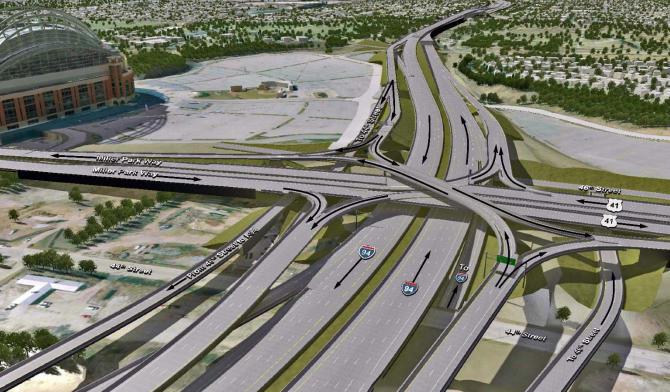In their fourth Highway Boondoggles report, U.S. PIRG and the Frontier Group profile wasteful highway projects that state DOTs are building across the country. Today's boondoggle: the I-94 expansion outside of Milwaukee, Wisconsin. The highway expansion is moving forward as part of a costly incentive package for an electronics manufacturer, draining resources from other state projects.
In Wisconsin, which is groaning under the weight of billions of dollars of highway debt, a major highway construction project is moving forward largely to serve a single business.
Wisconsin is spending $1.7 billion to $1.9 billion (in 2009 dollars) to widen the I-94 freeway from Milwaukee to near the Illinois state line from six to eight lanes. The project will involve the replacement of seven interchanges along the route, along with the total rebuilding of many stretches of highway.
Small amounts of construction have already taken place. Yet plans to undertake the largest pieces of construction are only moving forward thanks to a $4 billion incentive package to lure Foxconn, a tech manufacturer, to Wisconsin. Alongside tax breaks and other various incentives, the package includes up to $252 million to help complete the widening project. Most of the rest of the money will also come from state sources, although Wisconsin is applying for federal grant money. Wisconsin is also planning to spend another $134 million on other road projects in the area around the new factory site, money that is being drawn from other transportation projects in the state.
The I-94 expansion will use up already-scarce transportation dollars. After years of borrowing to build expensive highways, as of 2015 Wisconsin had $3.8 billion in highway debt, five times more than in 2000. And in 2014, Wisconsin spent $670 million on debt servicing, eight times more than 2000. With transportation funds depleted, lawmakers have had to turn to general taxpayer funds to cover transportation costs. And Wisconsin has already abandoned other highway expansion projects, including a separate section of I-94, after failing to come up with funding.
With so much existing debt, the I-94 expansion will leave little money left for transit needs. One critical need is for the creation of transit service between the new plant site and Milwaukee. Local officials have proposed new bus routes and a new commuter rail route – but they lack the funding support that the I-94 expansion has received. Officials are also working to improve train service between Milwaukee and Chicago, which is currently served by an Amtrak line that makes only seven trips per day. Although plans for a $200 million service expansion are developing, the Milwaukee Journal-Sentinel reports that the project is moving far more slowly than the I-94 expansion, with no set completion date.
Wisconsin also needs funding for road repairs. More than 70 percent of Wisconsin’s roads are in poor or mediocre condition, tied for second worst in the country.






